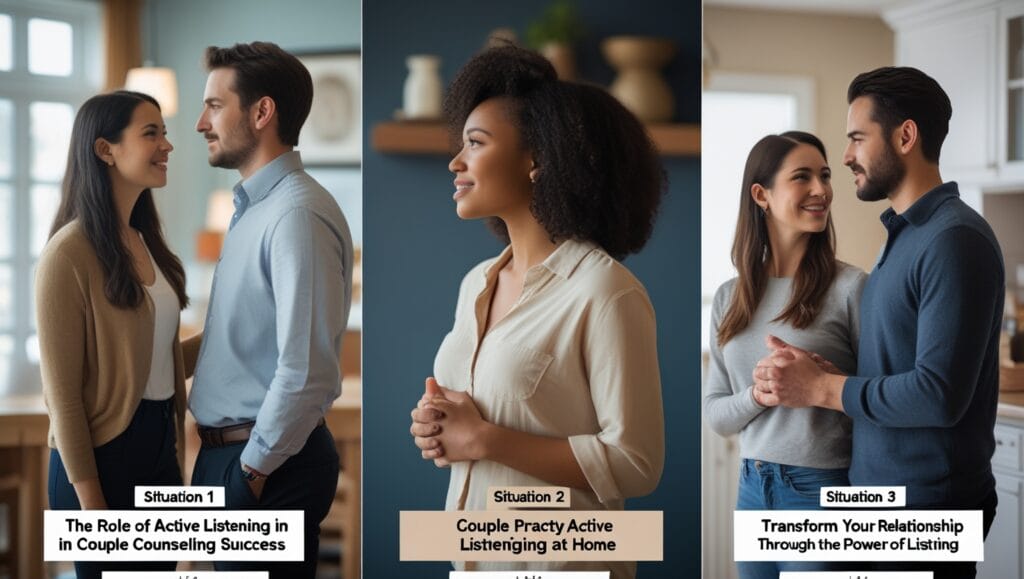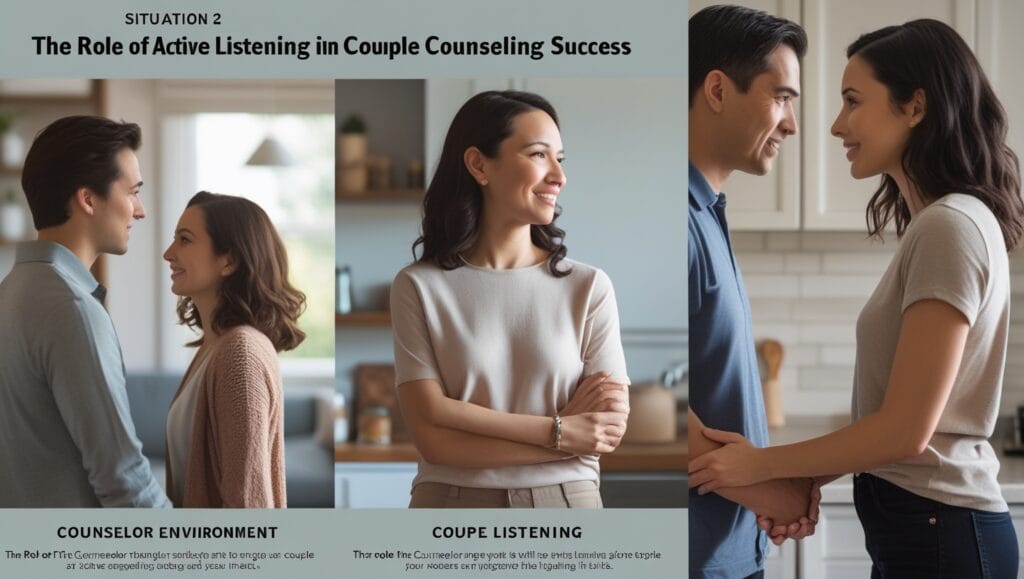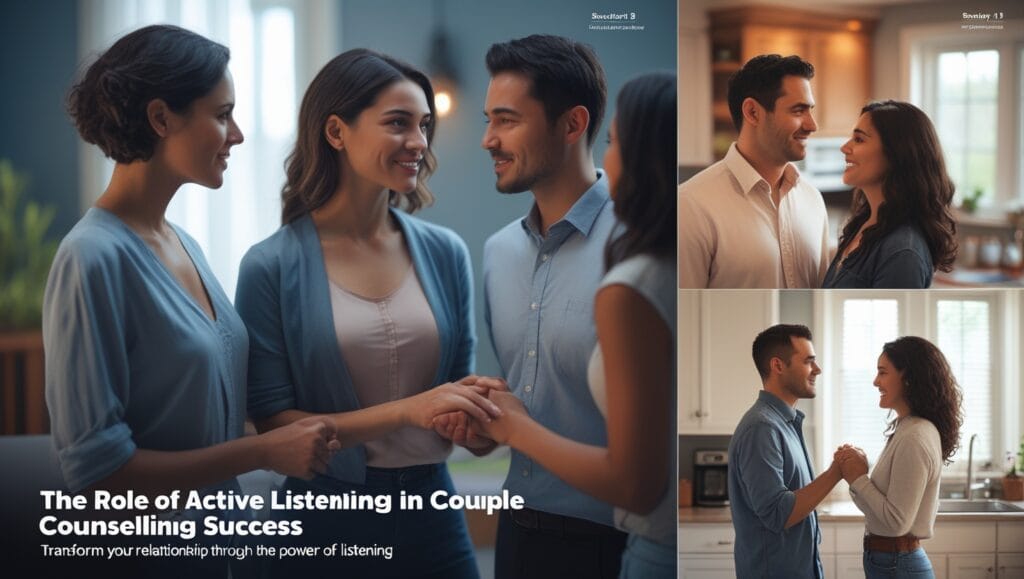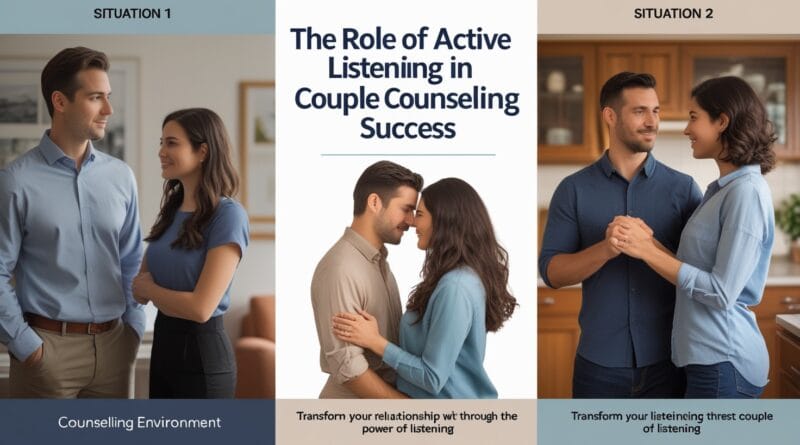The Role of Active Listening in Couple Counseling Success
Effective communication is often hailed as the bedrock of a thriving relationship. Yet, even with this common knowledge, many couples struggle to truly understand each other. This is where the power of active listening—a foundational skill in couple counseling—comes into play. But what exactly is active listening, and how does it impact the success of couples counseling?
In this blog, we break down the importance of active listening in couple counseling-from how it works and its benefits to actionable tips that will make this tool a staple in your relationship toolbox. Whether you are a couple trying to improve your communication, a newlywed navigating married life, or a therapist teaching your clients, this article delivers just the right mix of practical knowledge and strategies for success.
Active Listening: What Is It?
Active listening is a conscious effort to understand, interpret, and respond to another person in conversation. Unlike passive listening, where one’s focus may be elsewhere or the response reactive rather than considered, active listening requires your full attention and engagement. It calls for listening without judgment and reflecting upon what is being said with empathetic responses. As simple as this may sound, active listening involves the art of mastery in:
- Give Undivided Attention: Eliminate distractions and focus entirely on your partner’s words, tone, and expression.
- Understand the Message: Look beyond words to grasp underlying emotions and unspoken concerns.
- Respond Thoughtfully: Do not interrupt or offer solutions immediately; instead, emphasize empathy and understanding.
This form of communication is one of the important tools in couple counseling, where rebuilding trust, fostering understanding, and re-establishing emotional intimacy is often the goal.

Why Does Active Listening Matter in Couple Counselling?
Couples’ counseling aims to create an opportunity which is safe for the couple to share their feelings, conflicts, and goals. In this kind of setting, active listening provides the very base that people need for troubleshooting and improving a relationship for good. Here’s why it matters:
- Fosters Understanding Between Partners
Many conflicts arise not from the disagreements themselves but from feeling unheard or misunderstood. Active listening bridges this gap. When both partners feel genuinely heard, they’re more likely to approach challenges collaboratively instead of defensively.
- De-Escalates Arguments
Arguments often spiral when emotions override rationality. Active listening encourages a pause-an opportunity to hear and process each other calmly. By validation of emotions, it helps lower the emotional temperature of a conversation.
- Nurtures Emotional Intimacy
When one partner listens to the other, it mirrors back care, respect, and recognition. In time, emotional connections strengthen, intimacy is nurtured, and a safe place becomes available in which vulnerabilities can be expressed.
- Fosters Constructive Problem-Solving
With an emphasis on comprehension rather than blame, active listening allows both partners to shift focus onto solutions rather than fault. This leads to more constructive conversations both during and outside of the counseling sessions themselves.
Key Techniques to Practice Active Listening in Relationships
Active listening practices are easily implemented by anyone, whether it is in the counseling session or at home. Here are some actionable tips:

- Eliminate Distractions
Active listening begins with setting the environment. Switch off your phone, shut down your laptop, and engage in an uncluttered conversation space.
- Use Open Body Language
Non-verbal cues matter. Make eye contact, nod occasionally, and keep a relaxed posture to signal your attention.
- Reflect and Paraphrase
If your partner has finished what they had to say, briefly summarize what you think they meant. That helps make sure you’re on the same page. As in saying, “It sounds like you’re feeling overwhelmed by work. Is that correct?”
- Practice Emotional Validation
Acknowledge your partner’s feelings, even when you don’t quite agree. Simple statements, such as “I can see how upsetting that must have been for you,” demonstrate empathy and understanding.
- Don’t Interrupt
Jumping in with a cutting comment or early solution will dampen the conversation. Let your partner finish their thought before you respond.
- Ask Open-Ended Questions
Generate deeper reflection by asking questions that probe for feelings and logic. Avoid leading yes-or-no questions; instead, use, “What made you feel that way?” or “Can you tell me more about it?”
Common Challenges and Solutions in Active Listening
Challenge 1: Feeling the Need to “Fix” Things
Most partners listen to offer solutions, rather than simply understand. Problem-solving does have a place, of course, but this approach leaves the other feeling dismissed.
Solution: Focus on the feelings first. Then you can proceed together to decide whether an advice or solution is called for.
Challenge 2: Losing Focus
Staying fully present can be tough, particularly in a very distracted environment.
Solution: Train yourself to catch yourself when your mind starts to wander. Use visual or physical cues—such as eye contact or lightly nodding—to refocus yourself on the conversation.
Challenge 3: Misjudging Non-Verbal Messages
Partners often misread body language or tone and create unnecessary friction.
If you’re not sure about a non-verbal cue, then softly clear it up by saying, “I noticed your tone changed—are you okay?” or “Can I ask what you’re thinking right now?””

Frequently Asked Questions About Active Listening in Couple Counselling
What is the role of the counselor in active listening?
The counselor models active listening in sessions to show how one should listen empathetically while guiding the couple on how to take over the same in their conversations. They also facilitate discussions that ensure the partners are heard.
Can active listening help with long-standing conflicts?
Yes. Most of the persistent conflicts occur due to some unexpended emotions or misunderstandings. Active listening helps to replay these issues with empathy and clarity for a new understanding. Can active listening be practiced without counseling?
Absolutely. While counseling brings expertise, the practice of active listening at home can greatly contribute to better communication and relationship satisfaction. Couples who engage purposefully with active listening techniques have reported improvements in their interaction dynamics.
What can I do if my partner doesn’t actively listen to me?
Relationships work most effectively when both partners give, but you can lead by example. Your behavior, in time, might motivate your partner to imitate you. If that doesn’t happen, couples counseling offers a forum for such issues.
Does active listening work as well for non-verbal communicators?
Yes, active listening applies to non-verbal cues such as gestures, facial expressions, and body language. Non-verbal communicators can benefit by paying close attention to these signs and responding empathetically.
Transform Your Communication with Active Listening
Active listening isn’t just a skill-it’s a game-changer for relationships, trust, intimacy, and understanding. Be it minor misunderstandings or serious relationship challenges, active listening can help form better relationships.
Couples’ therapy with a trained professional is one sure step in your growth towards taking another stride ahead, forward. Here, expert counsel mixed with determined listening by will creates the surest road to lasting success of a relationship.
Take a small initiative and practice over and over-all this while magically molding your bond into an empire of lifelong partnership, on the firm founding blocks of Empathy and Comprehension.

